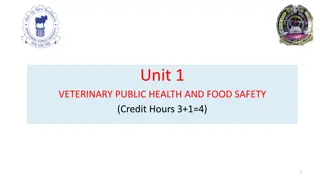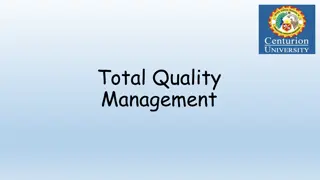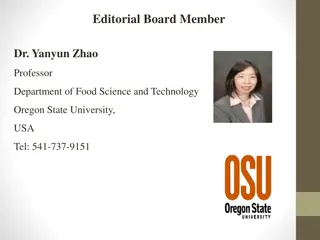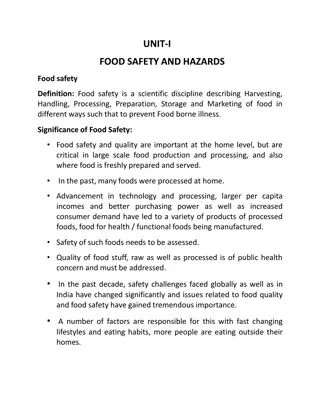
Unlocking 5 Benefits of Food Safety Management
Investing in food safety management can deliver significant benefits to food businesses, including protecting consumer health, enhancing brand reputation, ensuring regulatory compliance, reducing costs and waste, and facilitating market access. By prioritizing food safety and implementing robust FSMS, businesses can strengthen their competitive position, build customer trust, and achieve long-term success in the food industry.
Download Presentation

Please find below an Image/Link to download the presentation.
The content on the website is provided AS IS for your information and personal use only. It may not be sold, licensed, or shared on other websites without obtaining consent from the author. If you encounter any issues during the download, it is possible that the publisher has removed the file from their server.
You are allowed to download the files provided on this website for personal or commercial use, subject to the condition that they are used lawfully. All files are the property of their respective owners.
The content on the website is provided AS IS for your information and personal use only. It may not be sold, licensed, or shared on other websites without obtaining consent from the author.
E N D
Presentation Transcript
Unlocking 5 Benefits of Food Safety Management Implementing a robust food safety management system (FSMS) can offer numerous benefits to food businesses. Here are five key advantages: Protecting Consumer Health: The primary goal of any FSMS is to ensure that food products are safe for consumption. By implementing preventive measures and controls to identify and mitigate potential hazards, businesses can significantly reduce the risk of foodborne illnesses and protect the health and well-being of consumers. Enhancing Brand Reputation: A strong commitment to food safety can enhance the reputation of a food business. Consumers are increasingly concerned about the safety and quality of the food they consume, and businesses that prioritize food safety are more likely to earn their trust and loyalty. A positive reputation for food safety can differentiate a business from its competitors and attract new customers. Compliance with Regulations: Compliance with food safety regulations is essential for food businesses to operate legally and avoid penalties or legal consequences. Implementing an FSMS based on internationally recognized standards such as HACCP or ISO 22000 can help businesses meet regulatory requirements and demonstrate their commitment to food safety to regulatory authorities, customers, and other stakeholders. Reducing Costs and Waste: Implementing an FSMS can lead to cost savings by reducing the incidence of foodborne illnesses, product recalls, and rework or disposal of contaminated products. By identifying and addressing potential hazards in the production process, businesses can minimize waste, improve efficiency, and optimize resource utilization, leading to lower operational costs and improved profitability. Facilitating Market Access: Certification to internationally recognized food safety standards can facilitate market access for food businesses by demonstrating compliance with customer requirements, regulatory standards, and industry best practices. Many retailers, distributors, and foodservice providers require suppliers to be certified to specific food safety standards as a condition of doing business. Certification can open doors to new markets and business opportunities, helping businesses expand their reach and grow their customer base. Overall, investing in food safety management can deliver significant benefits to food businesses, including protecting consumer health, enhancing brand reputation, ensuring Unit No 514, 5th Floor, Sector 48 Vipul Business Park, Sohna Road Gurgaon, Haryana, 122018 Phone: +91-7011768166, 8860610495 Email: support@siscertifications.com
regulatory compliance, reducing costs and waste, and facilitating market access. By prioritizing food safety and implementing robust FSMS, businesses can strengthen their competitive position, build customer trust, and achieve long-term success in the food industry. Unit No 514, 5th Floor, Sector 48 Vipul Business Park, Sohna Road Gurgaon, Haryana, 122018 Phone: +91-7011768166, 8860610495 Email: support@siscertifications.com






















